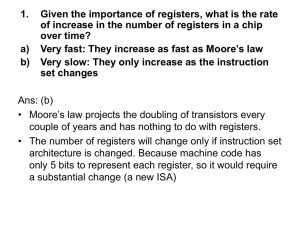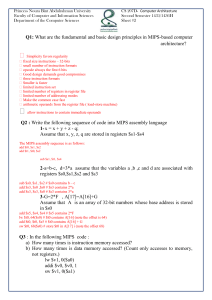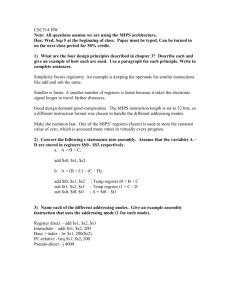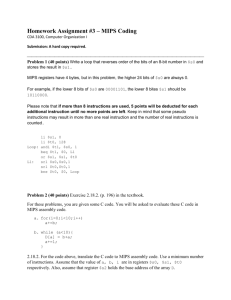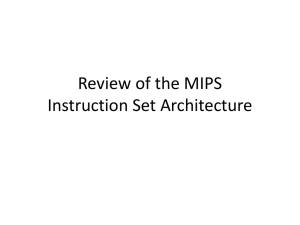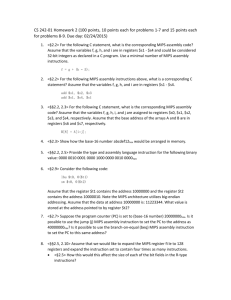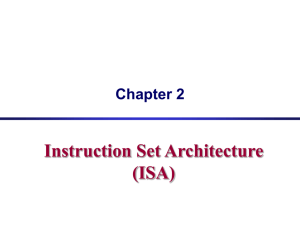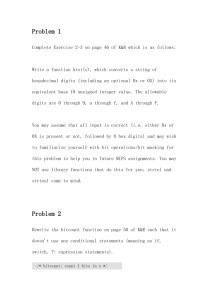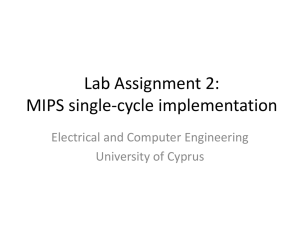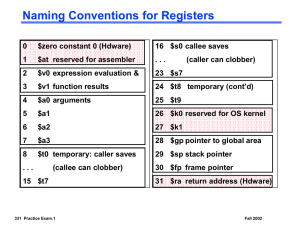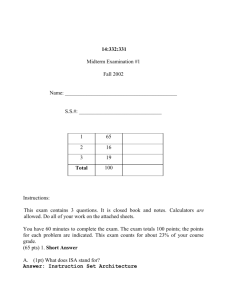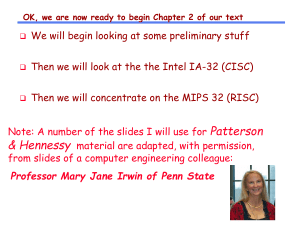Lectures 3-4: MIPS instructions
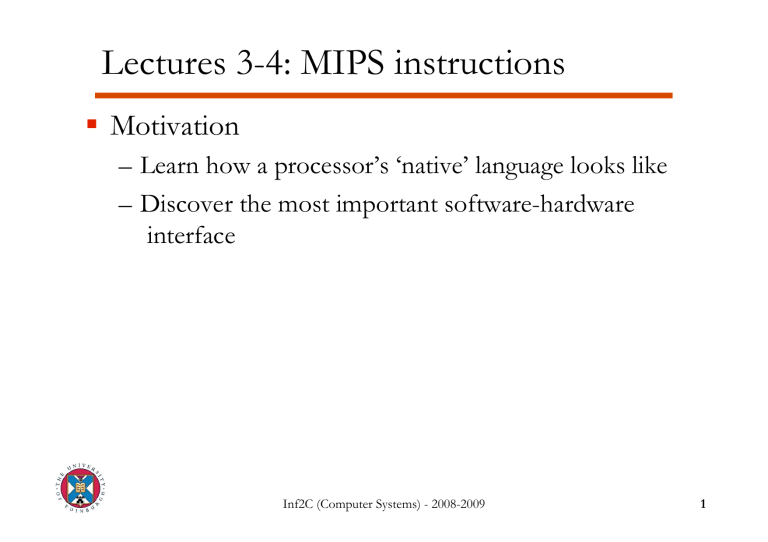
Lectures 3-4: MIPS instructions
Motivation
– Learn how a processor’s ‘native’ language looks like
– Discover the most important software-hardware
interface
Inf2C (Computer Systems) - 2008-2009 1
Outline
Instruction set
Basic arithmetic & logic instructions
Processor registers
Getting data from the memory
Control-flow instructions
Method calls
Inf2C (Computer Systems) - 2008-2009 2
Processor instructions
Instruction set (IS): collection of all machine
instructions recognized by a particular
processor
The instruction set abstracts away the hardware
details from the programmer
– The same way as an object hides its implementation
details from its users
Instruction Set Architecture (ISA): a generic
processor implementation that recognizes a
particular IS
Inf2C (Computer Systems) - 2008-2009 3
RISC – CISC machines
There are many ways of defining the hardware-software
interface defined by the instruction set
– Depends on how much work the hardware is allowed to do
RISC=Reduced Instruction Set Computer
CISC=Complex Instruction Set Computer
High-level language (HLL): a=b+10
Assembly language:
– RISC: lw r4,0(r2) # r4=memory[r2+0] add r5,r4,10 # r5=r4+10 sw r5,0(r3) # memory[r3+0]=r5
– CISC:
ADDW3 (R5),(R2),10
Inf2C (Computer Systems) - 2008-2009 4
Assembly language
Instructions are represented internally as binary
numbers
– Very hard to make out which instruction is which
Assembly language : symbolic representation of
machine instructions
We use the MIPS IS, typical of a RISC processor
Inf2C (Computer Systems) - 2008-2009 5
Arithmetic & logical operations
Data processing instructions look like: operation destination var, 1 st operand, 2 nd operand add a,b,c a = b+c sub a,b,c a = b − c
Bit-wise logical instructions: and, or, xor
Shift instructions: sll a,b,shamt a = b << shamt srl a,b,shamt a = b >> shamt, logical shift
Inf2C (Computer Systems) - 2008-2009 6
Registers
IS places restrictions on instruction operands
RISC processors operate on registers only
Registers are internal storage locations holding
program variables
Size of register equals the machine’s word
There is a relatively small number of registers
present; MIPS has 32
Inf2C (Computer Systems) - 2008-2009 7
MIPS general-purpose registers
Generally, any register available for any use
Conventions exist for enabling code portability
Java variables held in registers
$s0 – $s7
Temporary variables:
$t0 – $t9
Register 0 (
$zero
) is hardwired to 0
Other registers with special roles
Program Counter (PC) holds address of next
instruction to be executed
– Not one of the general purpose registers
Inf2C (Computer Systems) - 2008-2009 8
Immediate operands
MIPS has instructions with one constant
( immediate ) operand, e.g. addi r1,r2,n # r1=r2+n
Load a (small) constant into a register: addi $s0,$zero,n # $s0=n ($s0
15-0
=n; $s0
31-16
=0)
Assembler pseudo-instruction li reg,constant
– Translated into 1 instruction for immediates < 16bits
and to more instructions for more complicated
cases e.g. for a 32-bit immediate lui $s1,n1 # $s1
15-0
=0; $s1
31-16
=n1 ori $s1,$s1,n2 # $s1
15-0
=n2; $s1
31-16
=n1
Inf2C (Computer Systems) - 2008-2009 9
Getting at the data
Java
: Class MyClass {
int var1,var2;
}
… myObj = new MyClass( )
… temp = myObj.var2
$s2
0
4
8
MIPS:
($s2 points to base of myObj) lw $t1,4($s2) # $t1=memory[4+$s2] offset of var2 within myObj 2 30
Inf2C (Computer Systems) - 2008-2009
32 bits var1 var2
10
Data-transfer instructions
offset
Load Word: base address lw r1,n(r2) # r1=memory[n+r2]
Store Word: sw r1,n(r2) # memory[n+r2]=r1
Load Byte: lb r1,n(r2) # r1
7-0
= memory[n+r2]
r1
31-8
= sign extension
Store Byte: sb r1,n(r2) # memory[n+r2]=r1
7-0
no sign extension
Inf2C (Computer Systems) - 2008-2009 11
Memory addressing
Memory is byte addressable , but it is organised
so that a word can be accessed directly
Where can a word be stored?
Anywhere ( unaligned ), or at an mult. 4 address ( aligned )?
Which is the address of a word? bit 31
Big Endian bit 0 bit 31
Little Endian bit 0
4 5 6 7 word 4
0 1 2 3 byte0 byte1 byte2 byte3
7 6 5 4 word 4
3 2 1 0 byte3 byte2 byte1 byte0
Inf2C (Computer Systems) - 2008-2009 12
Instruction formats
Instruction representation composed of bit-fields
Similar instructions have the same format
MIPS instruction formats:
– R-format ( add , sub , …)
31 op
26 21 16 11 rs rt rd shamt
6 func
0
Main opcode
1st operand
2nd operand result shift sub-function opcode
– I-format ( addi , lw , sw , …)
31 26 21 16 0 op rs rt immediate
1st operand result
Inf2C (Computer Systems) - 2008-2009 13
MIPS instructions – part 2
Last time:
– Data processing instructions: add, sub, and, …
Registers only and immediate types
– Data transfer instructions: lw, sw, lb, sb
– Instruction encoding
Today:
– Control transfer instructions
Inf2C (Computer Systems) - 2008-2009 14
Control transfers: If structures
Java: if (i!=j) stmnt1 else
“if case”
“else case” stmnt2
“follow through”
MIPS
: stmnt3 beq $s1,$s2,label
“branch if equal”: compare value in $s1 with value in $s2
and if equal then branch to instruction marked label
beq $s1,$s2,label1 stmnt1
j label2 # skip stmnt2 label1: stmnt2 label2: stmnt3
Inf2C (Computer Systems) - 2008-2009 15
Control transfer instructions
Conditional branches, I-format:
31 26 21 16
4 r1 r2 offset beq r1,r2,label
0
– In assembly code label is usually a string
– In machine code label is obtained from immediate
value as: branch target = PC + 4 * offset
Similarly: bne r1,r2,label # if r1!=r2 go to label
Unconditional jump, J-format: j label
31
2
26 target
0
Inf2C (Computer Systems) - 2008-2009 16
Loops in assembly language
Java: while (count!=0) stmnt
MIPS: loop: beq $s1,$zero,end # $s1 holds count stmnt
j loop # branch back to loop end: …
Java: while (flag1 && flag2) stmnt
MIPS: loop: beq $s1,$zero,end # $s1 holds flag1
beq $s2,$zero,end # $s2 holds flag2 stmnt
j loop # branch back to loop end: …
Inf2C (Computer Systems) - 2008-2009 17
Comparisons
“Set if less than” (R-format): slt r1,r2,r3
– set r1 to 1 if r2<r3, otherwise set r1 to 0
Java: while (i > j) stmnt
MIPS example:
– assume that $s1 contains i and $s2 contains j loop: slt $t0,$s2,$s1 # $t0 = (i > j)
beq $t0,$zero,end # true if i <= j stmnt
j loop # jump back to loop end: …
Inf2C (Computer Systems) - 2008-2009 18
Method calls
Method calls are essential even for a small program
Most processors provide support for method calls
Java: call to foo at line L1
… foo();
… foo();
… call to foo at line L2 void foo() {
… return;
} where do we return to?
Inf2C (Computer Systems) - 2008-2009 19
MIPS support for method calls
Jumping into the method: jal label
– “jump and link”: set $ra to PC+4 and set PC to label
– Another J-format instruction
Returning: jr r1
– “jump register”: set PC to value in register r1
Inf2C (Computer Systems) - 2008-2009 20
Using a stack for method calls
Nested calls ⇒ must save return address to prevent
overwriting. Solution: use a stack in memory
call A
… call B
… call C to push a word:
Addr
A
B
C sp
(stack pointer) addi $sp,$sp,-4 # move sp down sw $ra,0($sp) # save r1 on top of stack
to pop a word: lw $ra,0($sp) # fetch value from stack addi $sp,$sp,4 # move sp up
Inf2C (Computer Systems) - 2008-2009 21
Other uses of the stack
Stack used to save caller’s registers, so that they
can be used by the callee
– “caller save” or “callee save” convention
Stack can also be used to pass and return
parameters
– MIPS uses $a0 – $a4 for the first 4 word-length
parameters, and $v0, $v1 for return values parameters
(caller context) return address
Inf2C (Computer Systems) - 2008-2009 22
